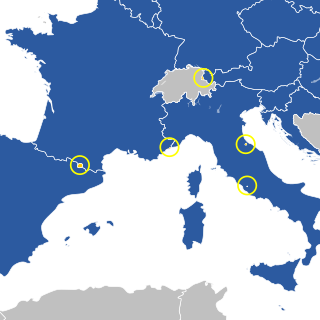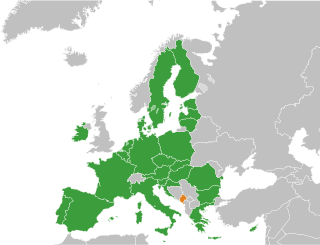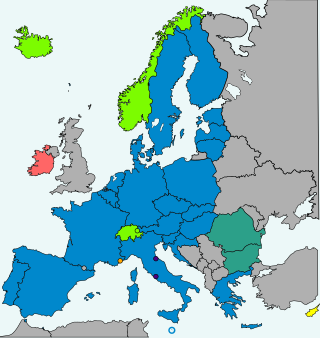| |||||
| Decades: | |||||
|---|---|---|---|---|---|
| See also: | |||||
Events in the year 1995 in the European Union .
| |||||
| Decades: | |||||
|---|---|---|---|---|---|
| See also: | |||||
Events in the year 1995 in the European Union .
The European Capital of Culture is a city designated by the European Union for a period of one calendar year, during which it organises a series of cultural events with a strong European dimension.

The European Union (EU) is a supranational political and economic union of 27 member states that are located primarily in Europe. The Union has a total area of 4,233,255 km2 (1,634,469 sq mi) and an estimated total population of over 448 million. The EU has often been described as a sui generis political entity combining the characteristics of both a federation and a confederation.

The Schengen Agreement is a treaty which led to the creation of Europe's Schengen Area, in which internal border checks have largely been abolished. It was signed on 14 June 1985, near the town of Schengen, Luxembourg, by five of the ten member states of the then European Economic Community. It proposed measures intended to gradually abolish border checks at the signatories' common borders, including reduced-speed vehicle checks which allowed vehicles to cross borders without stopping, allowing residents in border areas freedom to cross borders away from fixed checkpoints, and the harmonisation of visa policies.

The euro area, commonly called the eurozone (EZ), is a currency union of 20 member states of the European Union (EU) that have adopted the euro (€) as their primary currency and sole legal tender, and have thus fully implemented EMU policies.
The European Union has a number of relationships with foreign states. According to the European Union's official site, and a statement by Commissioner Günter Verheugen, the aim is to have a ring of countries, sharing EU's democratic ideals and joining them in further integration without necessarily becoming full member states.
European integration is the process of industrial, economic, political, legal, social, and cultural integration of states wholly or partially in Europe, or nearby. European integration has primarily but not exclusively come about through the European Union and its policies.

A customs union is the principal area of robust formal agreement between the Principality of Andorra and the European Union (EU). Andorra borders two EU member states: France and Spain.
Events from the year 2007 in the European Union.

The Prüm Convention is a law enforcement treaty which was signed on 27 May 2005 by Austria, Belgium, France, Germany, Luxembourg, the Netherlands and Spain in the town of Prüm in Germany, and which is open to all members of the European Union, 14 of which are currently parties.

Currently, all of the European microstates have some form of relations with the European Union (EU).

Accession of Montenegro to the European Union is on the agenda for future enlargement of the EU.

In general, the law of the European Union is valid in all of the twenty-seven European Union member states. However, occasionally member states negotiate certain opt-outs from legislation or treaties of the European Union, meaning they do not have to participate in certain policy areas. Currently, three states have such opt-outs: Denmark, Ireland and Poland. The United Kingdom had four opt-outs before leaving the Union.
Events in the year 1994 in the European Union.
Events from the year 1999 in the European Union.

The history of the European Union between 1993 and 2004 was the period between its creation and the 2004 enlargement. The European Union was created at the dawn of the post–Cold War era and saw a series of successive treaties laying the ground for the euro, foreign policy and future enlargement. Three new member states joined the previous twelve in this period and the European Economic Area extended the reach of the EU's markets to three more.

In the European Union (EU), enhanced cooperation is a procedure where a minimum of nine EU member states are allowed to establish advanced integration or cooperation in an area within EU structures but without the other member states being involved. As of October 2017, this procedure is being used in the fields of the Schengen acquis, divorce law, patents, property regimes of international couples, and European Public Prosecutor and is approved for the field of a financial transaction tax.
Events from the year 1996 in the European Union.
Events in the year 2015 in the European Union.
Events in the year 1993 in the European Union.

The Schengen acquis is a set of rules and legislation, integrated into European Union law, which regulate the abolition of border controls at the internal borders within the Schengen Area, as well as the strengthening of border controls at the external borders.

The United Kingdom was a member state of the European Union and of its predecessor the European Communities from 1973 until 2020. Since the foundation of the European Communities, it has been an important neighbour, and was a leading member state until its withdrawal from the EU on 31 January 2020 as a result of Brexit, ending 47 years of membership.